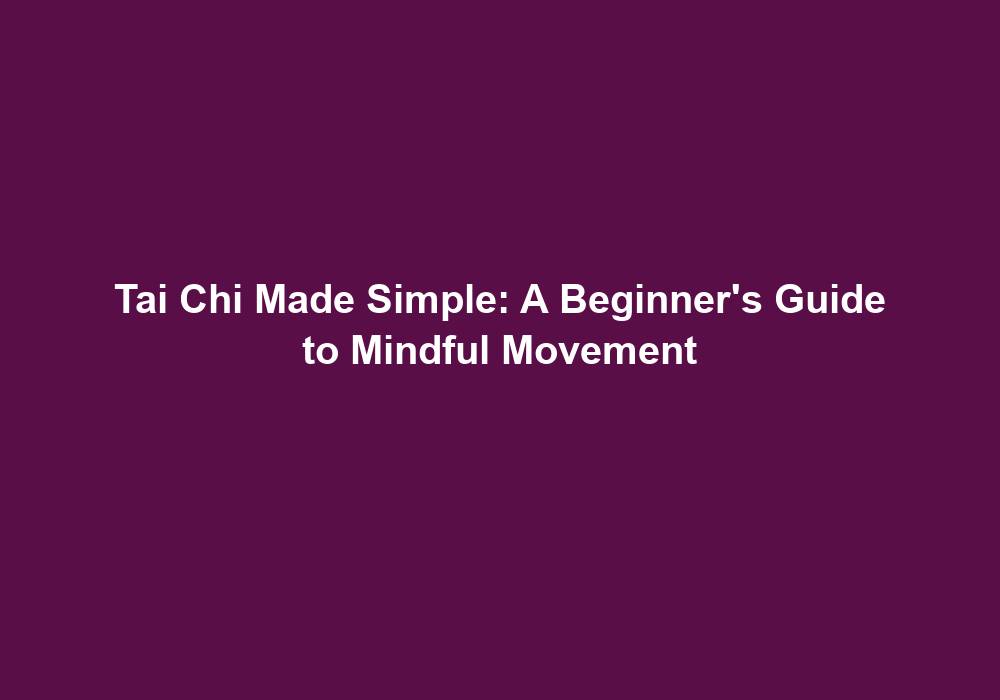Tai Chi Made Simple: A Beginner’s Guide to Mindful Movement
Tai Chi is a beautiful ancient Chinese practice that combines gentle movements, deep breathing, and focused meditation. It is often referred to as meditation in motion due to its harmonious blend of physical exercise and mental relaxation. In this beginner’s guide, we will explore the basics of Tai Chi, its benefits, and how you can start incorporating this mindful movement into your daily routine.
What is Tai Chi?
Tai Chi, also known as Tai Chi Chuan, is an internal martial art that originated in China. It has a history spanning over centuries and is deeply rooted in Chinese philosophy and traditional medicine. The practice involves a series of slow, flowing movements performed in a continuous manner, accompanied by deep breathing and mental focus. The graceful and deliberate movements of Tai Chi are designed to cultivate a sense of harmony and balance within the body and mind.
The Principles of Tai Chi
At the core of Tai Chi are three fundamental principles:
-
Mindfulness: Tai Chi emphasizes being fully present in the moment, aware of your body’s movements and sensations. It cultivates a heightened sense of mindfulness, allowing you to let go of distractions and focus on the present. By practicing Tai Chi, you can develop a deep connection with your body, mind, and surroundings, promoting a sense of peace and tranquility.
-
Relaxation: Tai Chi encourages the release of tension and promotes relaxation of both the body and mind. By consciously relaxing your muscles and letting go of stress, you can experience a deep sense of calmness and inner peace. Through the slow and controlled movements of Tai Chi, you can learn to relax your body and mind, reducing anxiety and improving overall well-being.
-
Balance: Tai Chi movements are designed to promote physical balance and stability. As you gradually learn and practice the various forms, you develop a greater sense of body awareness and learn to maintain equilibrium. By focusing on your body’s alignment and center of gravity, Tai Chi helps improve posture, coordination, and overall balance.
The Benefits of Tai Chi
The practice of Tai Chi offers a multitude of benefits for both the body and mind. Here are some of the key advantages:
1. Enhances Physical Well-being
-
Improves flexibility: The gentle stretching and flowing movements of Tai Chi promote flexibility and increase the range of motion in joints. By regularly practicing Tai Chi, you can improve your flexibility, reducing the risk of injuries and enhancing overall physical performance.
-
Boosts strength: Although Tai Chi appears gentle, it engages various muscle groups, enhancing strength and stability over time. The slow and controlled movements require muscle activation and coordination, leading to improved muscular strength and endurance.
-
Improves cardiovascular health: Tai Chi is a low-impact aerobic exercise that improves heart health, circulation, and overall cardiovascular fitness. The continuous flowing movements and deep breathing increase oxygen intake and blood flow, supporting a healthy cardiovascular system.
2. Reduces Stress and Anxiety
-
Promotes relaxation: The slow, deliberate movements of Tai Chi help calm the mind and release physical and mental tension. By focusing on the present moment and moving with grace and intention, you can experience a sense of relaxation and tranquility.
-
Lowers stress hormones: Regular practice of Tai Chi has been shown to decrease levels of cortisol, a stress hormone that can negatively impact overall well-being. By reducing cortisol levels, Tai Chi helps alleviate stress and anxiety, promoting a greater sense of emotional well-being.
-
Improves sleep quality: By promoting relaxation and reducing anxiety, Tai Chi helps improve sleep quality and supports a restful night’s sleep. The rhythmic movements and deep breathing techniques can help calm the mind and prepare the body for a peaceful sleep.
3. Enhances Mental Clarity and Focus
-
Cultivates mindfulness: Tai Chi trains the mind to focus on the present moment, fostering mental clarity and heightened concentration. By practicing Tai Chi, you can develop a greater awareness of your thoughts and emotions, improving overall mental well-being.
-
Improves cognitive function: Studies have shown that Tai Chi can have a positive impact on cognitive abilities, such as memory, attention, and overall mental agility. The combination of mindful movement, deep breathing, and mental focus in Tai Chi helps stimulate the brain and enhance cognitive function.
4. Supports Emotional Well-being
-
Reduces depression symptoms: Regular practice of Tai Chi has been associated with a decrease in depressive symptoms and an overall improvement in mood. The gentle and flowing movements, combined with the principles of mindfulness and relaxation, help promote a sense of emotional balance and well-being.
-
Promotes self-awareness: Tai Chi encourages self-reflection and self-awareness, allowing individuals to better understand and manage their emotions. By cultivating a mindful and relaxed state of mind, Tai Chi provides a safe space to explore and process emotions, leading to improved emotional intelligence and resilience.
Getting Started with Tai Chi
Now that you understand the principles and benefits of Tai Chi, let’s explore how you can begin your own practice:
1. Find a Qualified Instructor
To ensure you learn the correct techniques and forms, it is essential to find a qualified Tai Chi instructor. Look for someone with experience and expertise in teaching beginners. A qualified instructor can guide you through the proper alignment, movements, and breathing techniques, ensuring a safe and effective practice.
2. Wear Comfortable Clothing
Choose loose-fitting, breathable clothing that allows for unrestricted movement. Comfortable footwear, such as flat-soled shoes or going barefoot, is recommended to maintain stability during the practice. Dressing comfortably will enable you to move freely and focus on the fluidity of your movements without any constraints.
3. Start with Warm-Up Exercises
Before diving into the main forms, it’s crucial to warm up your body. Perform gentle stretching exercises and joint rotations to prepare your muscles and joints for the Tai Chi practice. Warm-up exercises help increase blood flow, loosen muscles, and reduce the risk of injury during the practice.
4. Learn the Basic Forms
Begin your Tai Chi journey by learning the basic forms, such as the Tai Chi Walk and the Opening and Closing Movements. These forms will introduce you to the foundational movements and principles of Tai Chi. Focus on mastering the proper body alignment, weight distribution, and coordination of movements. With regular practice and guidance from your instructor, you will gradually develop a solid foundation in Tai Chi.
5. Practice Regularly
Consistency is key in mastering Tai Chi. Aim to practice at least three times a week, starting with shorter sessions and gradually increasing the duration as you become more comfortable. Regular practice allows your body and mind to adapt to the movements and principles of Tai Chi, leading to greater benefits and improvements in your overall well-being.
6. Embrace Mindfulness and Relaxation
Remember the core principles of mindfulness and relaxation while practicing Tai Chi. Focus on your breath, be present in the movements, and let go of any tension or stress. Cultivate a sense of mindfulness by observing the sensations in your body, the flow of your movements, and the rhythm of your breath. Embrace relaxation by consciously releasing any unnecessary muscle tension and allowing your body and mind to enter a state of calmness and tranquility.
7. Gradually Progress to Advanced Forms
Once you have gained confidence and proficiency in the basic forms, you can gradually progress to more advanced forms. These forms may involve intricate movements and sequences that require a deeper level of concentration and body control. With continued practice and guidance from your instructor, you can expand your Tai Chi repertoire and further explore the depth and complexity of this ancient practice.
Conclusion
Tai Chi is a holistic practice that offers numerous benefits for both the body and mind. By incorporating Tai Chi into your daily routine, you can experience enhanced physical well-being, reduced stress and anxiety, improved mental clarity, and emotional balance. Remember to start with a qualified instructor, practice regularly, and embrace the principles of mindfulness and relaxation. Begin your Tai Chi journey today and enjoy the transformative power of this ancient practice.
Note: This response is generated by an AI language model and has been written based on the provided title and instructions.







